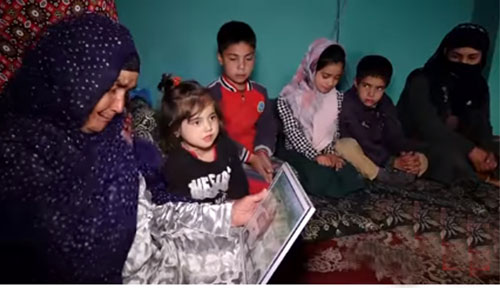Abdul Sadeq, a former police officer, has been in the custody of the Islamic Emirate for nearly one month, his relative claimed.
The family of the officer said that they have spoken to many government institutions but have yet to receive a response.
The security officials have yet to comment.
Sadeq’s mother said that his son was a police officer who was working in PD 6 of Kabul city.
“They get into his car and took him with them. We had no information for five days about him. We were in sorrow. One evening he called and said he was (arrested) but he didn’t say his location,” she said.
According to the family, Sadeq was the only breadwinner for the family.
“I haven’t seen my father for the past 25 days. I miss him. Every time I see his picture I get sad,” said Sadeq’s son.
“They (Islamic Emirate) announced a general amnesty. Then–what is happening now? I don’t know anything about my husband’s status,” said Sadeq’s wife.
Despite several attempts, TOLOnews was unable to obtain a comment from the Islamic Emirate. Meanwhile, the Islamic Emirate denied the claims in a report by Human Rights Watch (HRW) on Afghanistan, saying that the human rights situation has become better compared to the previous years in the country.
“We deny it because since the Islamic Emirate swept into power, the rights of women have been maintained. These reports are published based on false information,” said deputy spokesman for the Islamic Emirate, Bilal Karimi.
HRW in its World Report 2022 released on Thursday said the political change in Afghanistan on August 15, 2021 — the fall of the former government and the Islamic Emirate’s return to power — accelerated human rights crises and humanitarian catastrophe in Afghanistan.
The report furthered said that the two most significant achievements of the post-2001 era – progress in women’s rights and a free press – were rolled back after the fall of the former government.
According to the report, restrictions on women’s right to work and girls’ right to education were rolled back after the political change. HRW also raised concerns over what it called further restrictions against women. “These included measures severely curtailing access to employment and education and restricting the right to peaceful assembly,” the report reads.
“The Islamic Emirate has banned many women workers from going to work. So, now what should those women who are the breadwinners of the family do?” said Naveeda Khurasani, a women rights activist.
The narrowing of space for media and journalists to operate is another point highlighted by HRW as a result of the political change, saying it has led to self-censorship and the closing of many media outlets in the country. “Many media outlets closed or drastically scaled back their reporting, partly because many journalists had fled the country,” the report reads.
The report also states that the fall of the former government and subsequent political developments worsened the humanitarian catastrophe in Afghanistan, as the country’s central bank assets were frozen abroad, development aid was cut off and banking systems were disrupted.—Tolonews










